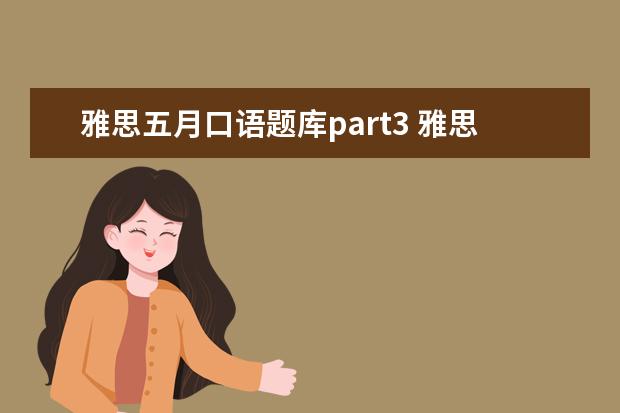雅思考试主要是通过对考生听、说、读、写四个方面英语能力的考核,综合测评考生的英语沟通运用能力,实现“沟通为本”的考试理念。对于雅思考生来说,也有很多考试难点和政策盲区需要帮助解答。今天雅思无忧网小编准备了雅思口语part3会问题库 雅思口语part3一般问几个问题,希望通过文章来解决雅思考生这方面的疑难问题,敬请关注。

雅思口语part3问了很多问题
雅思口语对于雅思备考的同学来讲都是一个不小的难点。雅思口语考试评分标准详细的介绍了口语分得分点,所以考生有必要去了解它们,同时还要知道一下part3的难点所在,因为这部分饥掘的樱肢伏难度是特别大的。
雅思口语part3相对来说是特别难的,它能够真实的反应一个烤鸭的水平如何,如脊携果想要考取口语的更高的分,那么大一定要有攻克这一块的能力,目前有一个办法就是去了解雅思口语考评分标准,然后再去了解这部分的难点,之后再去针对难点对症下药。下面小编给大家分享关于雅思口语part3的考试难点的相关内容,希望可以帮到正在雅思备考的同学。
雅思口语part3难点
难点一
口语考Part3不存在题库问题,任何一个general and abstract question related samet opicin Part2都有可能出现在Part3,所以这是它难的1点。
难点二
2个难点在于,有些学生会发现,在口语考中,“考官今天好像在怼我”为什么呢?
他说“考官都不让我把话讲完。”不让讲完,也就是说Part3存在另外一个很常见的现象是"打断"。
“打断”有两个常见的套路就是,先考官会不同意你的观点,其次考官会去追问你的观点。其实大会发现,这是一个跟日常生活会话比较接近的模式,你并不会提前知道你二天要跟对方聊什么,所以会比较考验大临场反应以及真实的语言水平。
雅思口语part3考官会问多少个问题? ?
?1.一般来说,到了part3这个环节,雅思考官已经基本了解你的口语情况了,所以他一般会问3-4个问题左右。
?2.不桥拿洞过这样是视情况而定的。如果你在part1和part2部分说的内容比较多,特别是在part2,说的内容已经非敏枯常翔实了,那么在第三部分考官有可能会减少一些问题。但是如果你part2没有说得特别充分,那么在第三部分考官肯定会多问你关于前面的敏燃内容,继续深挖下去的。
雅思口语Part 3的答题技巧演示。
今天,环球青藤朱滚睁国伟老师和大家分享一篇关于雅思口语Part 3的答题技大毕岁巧演示文章,值得大家阅读学习。更多精彩好文章,尽在环球青藤!雅思口语Part 3问题1:What are some reasons why people eat out ?雅思口语数唤Part 3的答题技巧演示1:It’s a tradition that we intend to treat our friends and family on some special occasions , especially on birthday , and some important days . a fancy restaurant can provide us decent dining environment , delicious cuisines and thoughtful service . by the way , these days , office workers are getting busier , they have no time to prepare home cooked food , eating outside is the only remaining option .雅思口语Part 3问题2:Do you prefer to eat at a restaurant or eat at home ?雅思口语Part 3的答题技巧演示2:I prefer to eat at home . my mother is good at cooking , she usually prepares a table of delicious dishes at home . by the way , my country has a notorious reputation of food security . so eating at home is much safer.雅思口语Part 3问题3 What are the differences between eating at home and eating at restaurants ?雅思口语Part 3的答题技巧演示3: Eating at restaurants , you may enjoying a decent dining environment , cuisines with different taste and flavor , and thoughtful service . compared to eating at restaurant , dishes prepared at home are simple but balanced and nutritious .雅思口语Part 3问题4In my opinion what is healthy food ?雅思口语Part 3的答题技巧演示4: A healthy meal should be balanced and nutritious . in each meal , we need to intake various vegetables , different kinds of fruits and many types of proteins . by such way , we may maintain a good physical health .雅思口语Part 3问题5What are some examples of unhealthy food ?雅思口语Part 3的答题技巧演示5:In my opinion , there are many types of unhealthy food , like western style fast food , desserts with high calories , and food sold at street vendors . food like French fries , hamburgers are very harmful to our health .以上即是本次环球青藤口语老师朱国伟的关于雅思口语Part 3的答题技巧演示文章分享。逻辑能力强,精通口语词汇。对于欧美的文化很了解。多年的教学经验帮助了不少雅思考生顺利进入理想学府,桃李满园。相信他的这篇文章必定能给与烤鸭们不少帮助和启发。如果对于我们雅思课程想了解更多的话,欢迎与环球青藤课程顾问做进一步的咨询与了解,这里有不同的单项课程以及全项课程,适合不同要求的你!后,环球托福预祝各位雅思考试取得!早日圆满出国留学梦!
雅思口语part3一般问几个问题
雅思口语part3一般问3-4个问题。
1、PART 1 ( 4-5 分钟):
雅思口语考官将问你一些非常直接的问题。第缺租猛一部分是整个口试中最简单的部分。考官就 一个话题将会问你 3 到 4 个问题。然后转到另一个话题。你将谈论你自己、你的专业、你的学习(过去或现在)、你的家庭、你的家乡、你的爱 好,或你的日常活动。要扩展你的回答,给出详细伏桥的信息,使其具有趣味性,这型锋样一切就会很好。问题不会很 难。只需要简单地围绕着问题回答,并向考官展示你能够交谈。别把事情复杂化。只要充分地回答每个问题即可。
2、PART 2 (1 分钟准备+2 分钟回答)
雅思口语考官将会给你一张卡片,上面写着一个主要问题和一些谈论的思路。你将有 1 分钟的时间去思考要说些什么。你可以做一些注记际应该做!!!)。没有做任何注记的考生在说了 1 分 30 秒之后往往说不下去了,频繁地重复,或犹豫很久。1分钟准备时间到,考官将请你 开始谈话。
3、PART 3 (4-5 分钟)
雅思口语考官将会询问与第二部分话题相关的问题。第三部分的问题将会更加“抽象化和概念化” (即问题的难度将会加大)。
雅思口语part3做题技巧?我这部分总是分数比较低 - ...
洛阳大华雅思提醒您,
一)题目的性质从原来较为生活化的Part 1和Part 2转化为Part3中带有强烈学术意味的考题。比如How does scientific research benefitspace, medical, environmental and information technologies? 该题问科学研究给现代技术带来怎样的好处。
二) 很多考题不再注重具体的细节描述或陈述,而转向考察考生的抽象思维能力。比如Does money bring people more happiness or make them less secure? 该题问钱会给人带来幸福,还是使人更不安全。碰猜拿
三)有相当数量的题目会让考生去对某个话题进行评估(Asses*ent),特别是利弊方面的评估;还有些考题让你对未来进行猜兆局测(Speculation),让你说10年或20年之后某事物将会怎么样。比如In your opinion, what languages will become morepopular in the future? 该题要你猜测将来什么语言会变得流行起来。当然,你还必须说明理由。
总的来说,Part 3已经超越了日常生活层面,进入到人的深层思维体系之中。它着重的是四样东西:world views(世界观),beliefsystems(信仰体系),values(价值观),attitudes(态度)。要把这些东西说好,除了平时的语言功底和随机应变的能力以外,考生还需要具备一些人文方面的素养。
虽然Part 3的问题错综复杂,但根据笔者的教学及实战经验,我们完全可以把所有Part 3的考题分为以下的九个大类,每一大类都含有若干典型的问话套路:
一)阐述原因(Giving reasons)
Why do you think …?
Why is it important to do…
Do you think …? Why (not)?
Is it a good idea to (do…)? Why (not)?
二)预测未来(Providing speculations)
How do you see … changingin the future?
Do you think that in thefuture people will …?
What do you think willhappen to … in the future?
In your opinion,which/what … will become more … in the future?
三)描述侧面(Describing various aspects)
In what ways …?
What kind/sort/type of …?
How important is it for …to (do …)?
How has … changed (in yourcountry) in the last … years?
四)维护立场(Defending your choice)
Is it better to (do …) or(do …)?
笑搭Should people always … oris it a good idea sometimes to (do …)?
Which is more important toyou: … or …?
Which do people in yourcountry prefer: … or …?
五)利用常识(Using your common sense)
Any yes-no question thatinvolves a clearly positive or negative answer
Any question that asks youabout the roles, responsibilities and general qualities of a social group
Any question that asks youabout common knowledge, everyday experience and traditional culture
六)提供方案(Offering solutions)
What can … do to (do …)?
What can be done to (do…)?
What do you think is thebest way for … to (do …)?
Are there other wayspeople can …, apart from …? How?
七)因果关联(Connecting causes with effects)
What effect has … had on…?
How has … affected …?
Are there any negativeeffects of … doing …? What are they?
What do you think causes …to …?
八)对比异同(Comparing similarities and differences)
How does … compare with …?
How do you compare … with…?
Do you think … wasdifferent for your grandparents?
What are similarities anddifferences between … and …?
九)陈述利弊(Illustrating advantages and disadvantages)
What are the advantages anddisadvantages of …?
What are the differentadvantages of … and …?
What do you think theirdisadvantages are?
How do people in yourcountry feel about (a controversial issue)?
从《剑桥雅思》的口语出题风格来看,一般一套口语题的Part3部分会有6道问题,这一点大家可以参阅《剑一》到《剑七》的真题。下面的这套题从place到travel/touri*再到old buildings/historic buildings,提出了一系列问题:
Why do you think peoplelike to travel to different places?
→ 第一类:阐述原因(Giving reasons)
How do you see touri*changing in your country in the future?
→ 第二类:预测未来(Providing speculations)
Why is it important toprotect the countryside?
→ 第一类:阐述原因(Giving reasons)本文
In what ways is thecountryside in danger in your country?
→ 第三类:描述侧面(Describing various aspects)
Why are historic buildingsand monuments important to a city?
→ 第一类:阐述原因(Giving reasons)
Is it better to keep oldbuildings, or build new modern ones?
→ 第四类:维护立场(Defending your choice)
由此可见,任何Part 3的问题都可以归入以上九大类中的某一类。在本系列的后面九讲中,针对每一类问题的特殊性,为大家一一分析破解它们的方法,也希望广大“烤鸭”们能切实利用这些方法来为自己的考场发挥添砖加瓦。
总的来说,雅思口语考试Part 3作为考试中第三部分,也是最困难的一个部分,所以把握好总结的雅思口语考试Part 3答题技巧也就非常重要.
以上就是雅思无忧网为您准备的雅思口语part3会问题库 雅思口语part3一般问几个问题全部内容。访问雅思无忧网(https://www.yasi.cn/),了解更多雅思考试新消息,新动态。
雅思培训
免责声明:文章内容来自网络,如有侵权请及时联系删除。


 雅思口语part3一般问几个问题 雅思口语Part3答题技巧讲解
雅思口语part3一般问几个问题 雅思口语Part3答题技巧讲解
 雅思口语part3有题库么 雅思口语part3一般问几个问题
雅思口语part3有题库么 雅思口语part3一般问几个问题
 雅思口语part3题库固定吗 雅思口语part3一般问几个问题
雅思口语part3题库固定吗 雅思口语part3一般问几个问题
 雅思口语part3题库电影或书 雅思口语part3一般问几个问题
雅思口语part3题库电影或书 雅思口语part3一般问几个问题
 雅思口语part3网上题库准吗 雅思口语part3一般问几个问题
雅思口语part3网上题库准吗 雅思口语part3一般问几个问题
 雅思口语part3一定来自题库吗 雅思口语part3一般问几个问题
雅思口语part3一定来自题库吗 雅思口语part3一般问几个问题
 雅思五月口语题库part3 雅思口语part3一般问几个问题
雅思五月口语题库part3 雅思口语part3一般问几个问题
 2020雅思part3口语题库 雅思口语part3一般问几个问题
2020雅思part3口语题库 雅思口语part3一般问几个问题
 雅思口语part3问了题库的题 雅思口语part3一般问几个问题
雅思口语part3问了题库的题 雅思口语part3一般问几个问题
 雅思口语part3都是题库的吗 雅思口语part3一般问几个问题
雅思口语part3都是题库的吗 雅思口语part3一般问几个问题